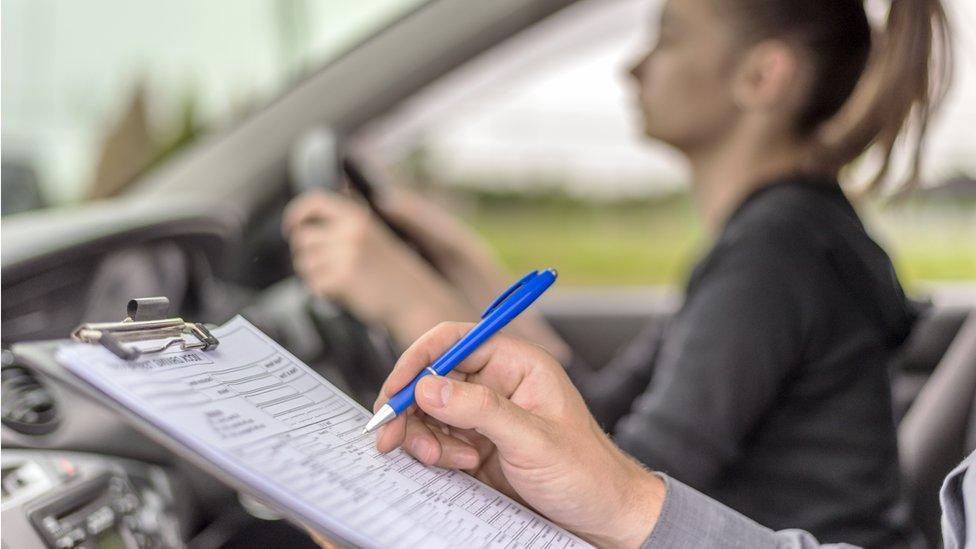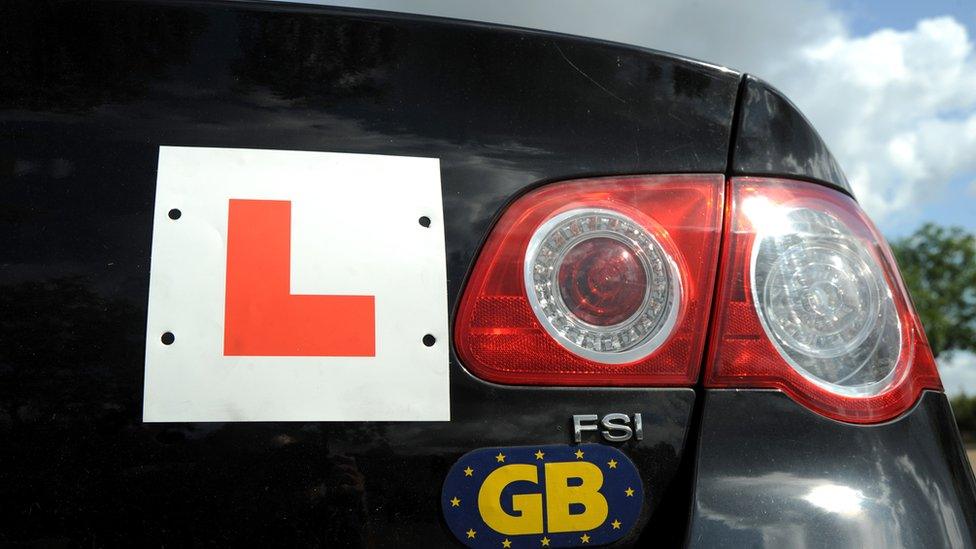Covid in Scotland: Learner drivers face 16-week wait for theory tests
- Published
- comments

Learner drivers in Scotland face a 16-week wait to sit a theory test - almost four times longer than candidates in England and Wales.
The Driver and Vehicle Standards Agency said its testing capacity was limited in Scotland as centres must ensure people observe 2m physical distancing.
South of the border only 1m physical distancing is required.
First Minister Nicola Sturgeon has said she will look at the situation to see how quickly capacity can be increased.
Driving lessons resumed in Scotland on 26 April and practical driving tests restarted on 6 May, following the easing of lockdown restrictions.
The average wait for practical tests is currently just under 14 weeks - compared to seven weeks pre-Covid - and broadly similar across Scotland, England and Wales.
But for theory tests the average wait in Scotland is 16 weeks, compared with just 4.6 weeks in England and Wales.
One MSP claims young people are missing out on jobs due to the backlog.


Are you learning to drive and facing a long wait for a theory or practical test? Please share your stories and pictures with us.
You can now get in touch with BBC Scotland on the phone messaging service, WhatsApp.
To start using the app, simply download WhatsApp on to your smartphone free from the internet, external.
Then add our WhatsApp number +44 7902 704679, external to your phone's contact list.
Please make sure you read our terms of use and privacy policy.

The DVSA said it was delivering as many tests as it could within the requirements.
A spokesman said: "We are doing all we can to offer more theory tests at our centres in Scotland by increasing opening hours and running tests on extra days where possible.
"The safety of our customers and staff is our priority and we can only increase the number of tests when physical distancing restrictions are eased by the Scottish government."
The DVSA said it did not keep records of whether people who live in Scotland are getting round the delays by crossing the border to sit their theory test.
But it added all candidates were reminded to observe local Covid restrictions.
The theory test pass certificate lasts for two years and individuals must pass their driving test in that time.
The agency said the certificate would not be extended because of the heath crisis as candidates' road safety knowledge and hazard perception skills need to be up to date when they are taking lessons and a practical test.
From Monday examiners will be able to conduct up to seven tests a day, as opposed to the current limit of six.
The DVSA said this will increase testing capacity to between 15,000 and 20,000 tests a month.

Scottish Conservative MSP Finlay Carson, who represents Galloway and West Dumfries, has urged the Scottish government to relax the physical distancing restrictions to speed up testing capacity.
During first minister's questions on Tuesday he asked Nicola Sturgeon to address the problem, which he claimed has had a greater impact in his constituency due to its poor public transport.
Mr Carson said: "There are genuine concerns for businesses this summer- particularly those in the hospitality and agricultural sector who are struggling to find employees, a situation that has already been highlighted by the local chamber of commerce.
"Having already been in contact with the Driver and Vehicle Standards Agency, it has stated that capacity at most theory test sites in Scotland has been reduced by 50% as a direct result of the Scottish government's two-metre physical distancing restrictions."
In her response, Ms Sturgeon said she recognised the importance of the matter and how "frustrating" the delays were.
But she also described the issues involved as "complex and rarely straightforward".
Ms Sturgeon added: "In certain environments, 2m physical distancing remains an important mitigation.
"However, the issue is important and we will continue to look at the situation to see how quickly we can increase capacity and get the backlogs down."


- Published6 May 2021

- Published22 April 2021
